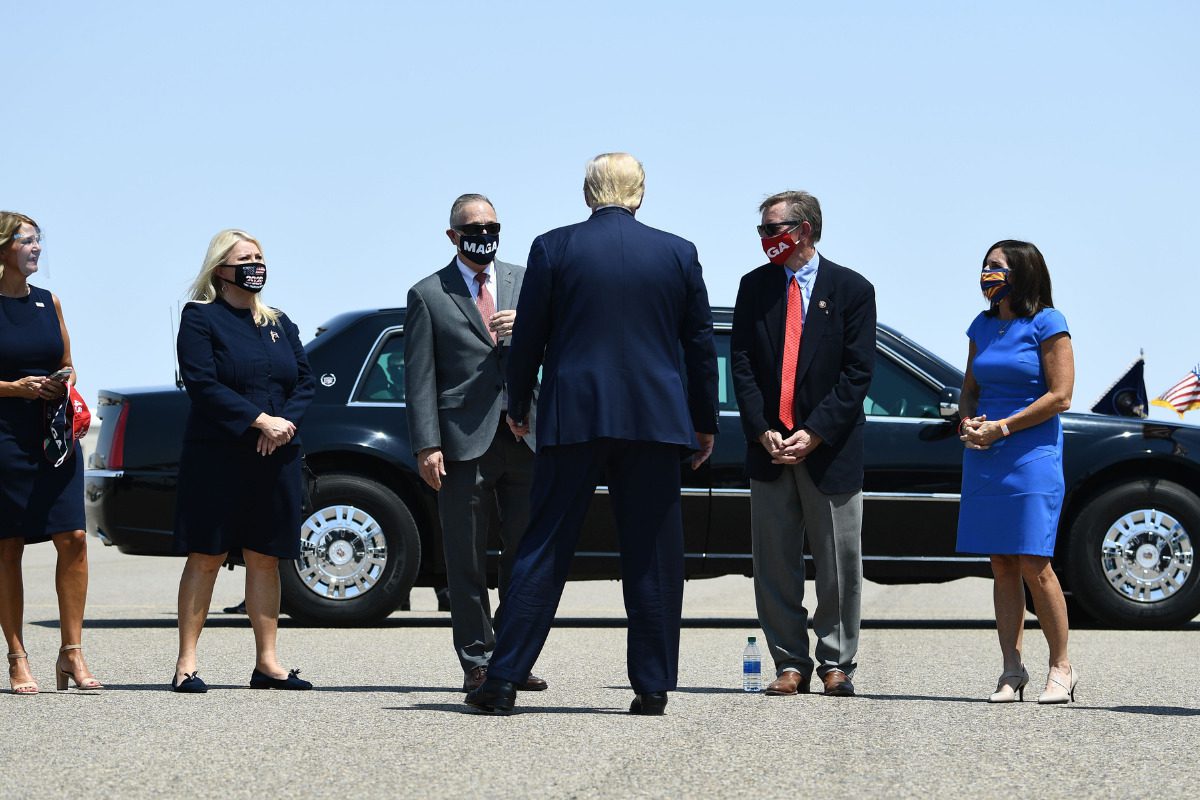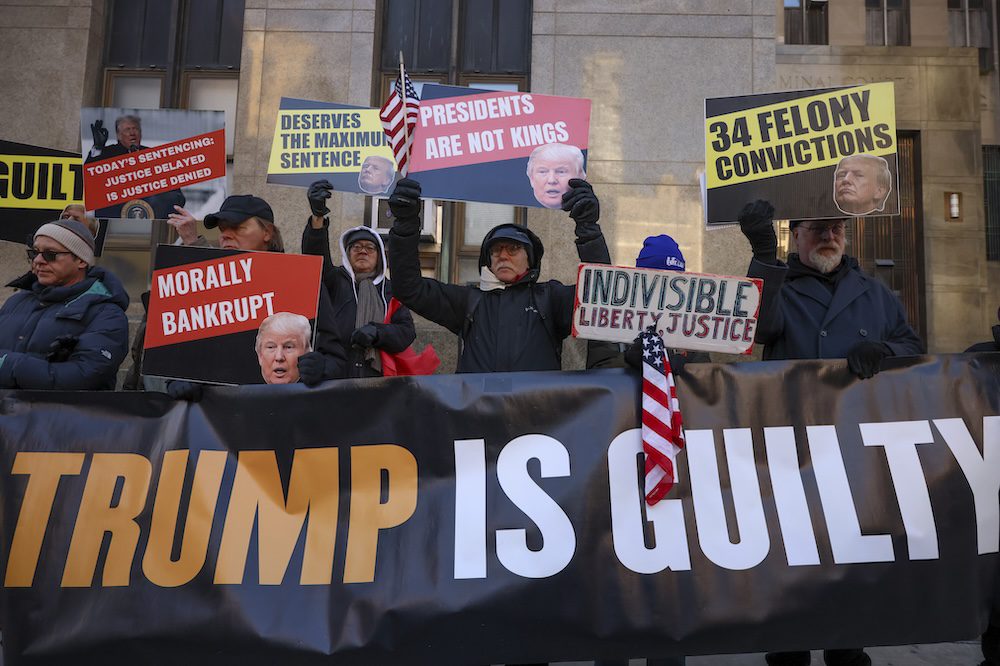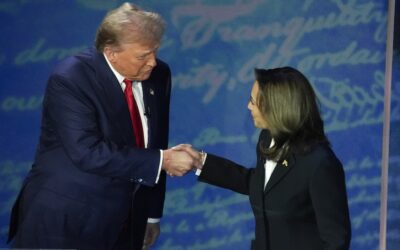
Chairwoman of the Arizona Republican Party Kelli Ward, Representative Debbie Lesko, Representative Andy Biggs, Representative Paul Gosar, and Senator Martha McSally (R-AZ) greet US President Donald Trump on the tarmac after he arrived at the international airport in Yuma, Arizona. Photo by Brendan Smialowski /Getty Images
A newly unsealed court filing details the lengths Donald Trump went to try and overturn the 2020 election results, outlining efforts his campaign went through in Arizona to pressure state officials to turn his loss into a win.
The document—filed by Jack Smith, a special counsel for the US Justice Department who has indicted Trump on four felony counts for conspiracy to defraud the United States—outlines how Trump “resorted to crimes” in an attempt to retain the presidency.
US District Judge Tanya Chutkan, who is presiding over the case, released a redacted version of the document at Smith’s request, removing names of individuals involved with the conspiracy who have not been indicted by Smith.
Much of what is in the court filing has been reported on by The Copper Courier, who have used past reporting to fill in the redacted names. That version can be read below, with names unredacted in bold.
The full court filing can be read here.
The unredacted Arizona portion
The defendant was on notice that there was no evidence of widespread election fraud in Arizona within a week of the election.
On November 9, for instance, two days after news networks projected that Biden had won, the defendant called Arizona Governor Doug Ducey to ask him what was happening at the state level with the presidential vote count in Arizona.
At that point, though Fox News had projected that Biden had won the state, several other news outlets, including ABC, NBC, CNN, and the New York Times had not yet made a projection.
Ducey walked the defendant through the margins and the votes remaining to be counted, which were
primarily from Pima County, which favored Biden, and Maricopa County, which was split. Ducey described the situation to the defendant as “the ninth inning, two outs, and [the defendant] was several runs down.
The defendant also raised claims of election fraud, and Ducey asked the defendant to send him supporting evidence. Although the defendant said he won – stating, “we’re packaging it up,” —he never did.
Shortly thereafter, on November 13, Campaign Manager Bill Stephen told the defendant directly that a false fraud claim that had been circulating- that a substantial number of non-citizens had voted in Arizona- was false.
The same day, as noted previously, Campaign attorneys conceded in court that the remaining election lawsuit in Arizona was moot.
The defendant and Rudy Giuliani continued to try to influence Ducey. For example, Giuliani tried to contact Ducey on November 22–the same day the defendant and Giuliani reached out to the Arizona Speaker of the House, as described below.
And on November 30, the day Ducey signed the Arizona certificate of ascertainment formally declaring Biden’s electors as the legitimate electors for Arizona,Ducey received a call from the defendant and Pence. Ducey advised them that Arizona had certified the election; when the defendant brought up fraud claims, Ducey–eager to see the evidence—-again asked the defendant to provide it, but the defendant never did.
Instead, later that evening and into the following morning, the defendant repeatedly publicly attacked Ducey (as well as Georgia Governor Brian Kemp) on Twitter, re-tweeting posts by others, such as:
“Who needs Democrats when you have Republicans like Kemp and Ducey?”
“Watching the Arizona hearings and then watching Gov. Ducey sign those papers, why bother voting for Republicans if what you get is Ducey and Kemp?”
“Kemp: ‘My state ran the most corrupt election in American history.’ Ducey: ‘Hold my beer, ‘”
“Why is Ducey still pretending he’s a member of the Republican Party after he just certified fraudulent election results in Arizona that disenfranchised millions of Republicans?”
The defendant and co-conspirators also attempted to use false fraud claims to convince political allies in the Arizona state legislature to ignore the popular vote and appoint illegitimate electors.
On November 22, the defendant and Giuliani called Rusty Bowers, the Speaker of the Arizona House of Representatives. Giuliani did most of the talking.
During the call, the defendant and Giuliani levied multiple false fraud claims—including of non-citizen, non-resident, and dead voters that affected the defendant’s race—and asked Bowers to use them as a basis to call the state legislature into session to replace Arizona’s legitimate electors with illegitimate ones for the defendant.
When Bowers voiced his deep skepticism, Giuliani said, “Well, you know, we’re all kind of Republicans, and we need to be working together.”
Bowers refused, and asked Giuliani to provide evidence supporting his fraud claims. Giuliani never did.
Indeed, Giuliani met with Bowers in person approximately a week later and still had nothing to back up his claims. On November 30, Giuliani, Jenna Ellis, and others arrived in Arizona for a “hotel hearing” —an unofficial meeting with Republican legislators—during which they promoted false fraud allegations.
In a meeting the day after the hearing, when state legislators pressed Giuliani and Ellis for evidence to support their claims, Giuliani conceded that even on that late date, “[w]e don’t have the evidence, but we have lots of theories. ”
When the legislators were frustrated that Giuliani had no support for his claims and asked him tough questions, Giuliani expressed surprise at the way he was being treated, stating, “Man, I thought we were all Republicans. . . . [T]his is a little more hostile a reception. rm amazed at the reception I’m getting here.”
On December 4, Bowers released a public statement in which he explained that he did not have the authority to use the legislature “to reverse the results of the election” and that doing so would constitute an attempt ”to nullify the people’s vote based on unsupported theories of fraud.”
Bowers made clear that he was disappointed with the legitimate election results because he “voted for President Trump and worked hard to reelect him” but would not “violate current law to change
the outcome of a certified election.”
On Twitter, Liz Harington, a Campaign staffer who worked [DOJ official] Jeffrey Clark, attacked Bowers for his statement, writing that Bowers ”is intentionally misleading the people of Arizona to avoid the inevitable.”
The defendant re-tweeted Harington’s false post and praised her.
A month later, just two days before January 6, John Eastman—another of the defendant’s private
attorneys and a co-conspirator—called Bowers and Bowers’ counsel, Kory Langhofer, and urged Bowers one last time to use the legislature to decertify Arizona’s legitimate electors and overturn the valid election results.
When Bowers told Eastman that there was no evidence of substantial fraud in Arizona, and that he could not legally call the legislature into session, Eastman was undeterred. He conceded that he “[didn’t] bow enough about the facts on the ground” regarding fraud Arizona, and said that Bowers should nonetheless falsely claim that he had the authority to convene the legislature and “let the courts sort it out.” Bowers again refused.
In the post-election period, Bowers was harassed; on several occasions, individuals gathered outside Bowers’ home with bullhorns and screamed and honked their vehicle horns to create noise.
Once, an individual in visible possession of a pistol and wearing a t-shirt in support of a militia group came onto Bowers’ property and screamed at him. 93 At the time of these events, Bowers’ daughter was at home and was very ill, and the noise caused her “disruption and angst.”
Support Our Cause
Thank you for taking the time to read our work. Before you go, we hope you'll consider supporting our values-driven journalism, which has always strived to make clear what's really at stake for Arizonans and our future.
Since day one, our goal here at The Copper Courier has always been to empower people across the state with fact-based news and information. We believe that when people are armed with knowledge about what's happening in their local, state, and federal governments—including who is working on their behalf and who is actively trying to block efforts aimed at improving the daily lives of Arizona families—they will be inspired to become civically engaged.


What is the 50501 movement? An explainer on the protests against Trump, Project 2025, and Elon Musk
50501 stands for 50 protests, 50 states, one day. Websites and social media accounts issued calls for action, with messages such as “reject fascism”...

Facing first tragedy of his presidency, Trump blames DEI, Obama for plane crash
Sixty-seven people are presumed to be dead after a passenger plane collided Wednesday night with a US Army helicopter midair while approaching...

Here’s what Trump promised to do on ‘Day One.’ Now that he and Republicans have total power in DC, will he?
The president-elect should be able to, in theory, implement his “Day One” plans. The big question is – will he actually do what he’s proposed? Or...

Trump makes history as 1st US President to be sentenced as a felon but avoids jail
Manhattan Judge Juan M. Merchan could have sentenced the 78-year-old Republican to up to four years in prison. Instead, he chose a sentence that...





